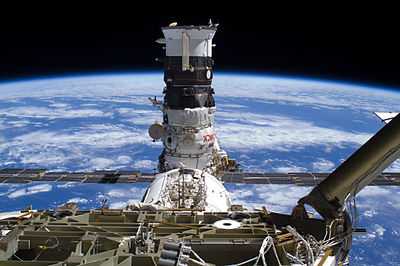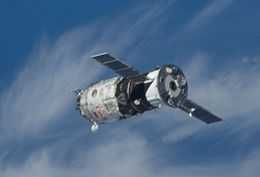Progress M-MIM2
Progress M-MIM2|
Progress M-MIM2 and Poisk as seen by Expedition 21. |
|
| Mission type |
ISS resupply |
|---|
| Operator |
Roskosmos |
|---|
| COSPAR ID |
2009-060A |
|---|
| SATCAT № |
36086 |
|---|
|
| Spacecraft properties |
|---|
| Spacecraft type |
Progress-M (modified) |
|---|
| Manufacturer |
RKK Energia |
|---|
| Launch mass |
7,102 kilograms (15,657 lb) |
|---|
|
| Start of mission |
|---|
| Launch date |
10 November 2009, 14:22:04 (2009-11-10UTC14:22:04Z) UTC[1] |
|---|
| Rocket |
Soyuz-U |
|---|
| Launch site |
Baikonur Site 1/5 |
|---|
|
| End of mission |
|---|
| Disposal |
Deorbited |
|---|
| Decay date |
8 December 2009, 05:27 (2009-12-08UTC05:28Z) UTC |
|---|
|
| Orbital parameters |
|---|
| Reference system |
Geocentric |
|---|
| Regime |
Low Earth |
|---|
| Perigee |
336 kilometres (209 mi) |
|---|
| Apogee |
344 kilometres (214 mi) |
|---|
| Inclination |
51.6 degrees |
|---|
| Period |
91.33 minutes |
|---|
| Epoch |
November 18, 2009[2] |
|---|
|
| Docking with ISS |
|---|
| Docking port |
Zvezda zenith (Poisk) |
|---|
| Docking date |
12 November 2009, 15:41 UTC |
|---|
| Undocking date |
8 December 2009, 00:16 UTC |
|---|
| Time docked |
25 1⁄2 days |
|---|
|
| Payload |
|---|
|
Poisk |
| Mass |
3,670 kilograms (8,090 lb) |
|---|
Progress M-MIM2 (Russian: Прогресс М-МИМ2), or Progress M-MRM2, originally designated Progress M-SO2,[3] was a modified Progress-M spacecraft which was used to deliver the Poisk module to the International Space Station.[4] It was based on the Progress-M 11F615A55 spacecraft, with the pressurised cargo module removed to accommodate Poisk, and had the serial number 302.[3] It was similar to the Progress M-SO1 spacecraft which was used to deliver the Pirs module to the station in 2001.

The launch of Progress M-MIM2 and Poisk

Progress M-MIM2 departs

Progress M-MIM2 and Poisk docked with the ISS
Progress M-MIM2 and Poisk were launched by a Soyuz-U carrier rocket flying from Site 1/5 at the Baikonur Cosmodrome. The launch occurred at 14:22 GMT on 10 November 2009.[4] At launch, Progress M-MIM2 had a total mass of 7,102 kilograms (15,657 lb), including the 3,670-kilogram (8,090 lb) Poisk module.[3][5]
The spacecraft docked with the zenith port of the International Space Station's Zvezda module on 12 November. Capture occurred at 15:41 GMT,[6] and initial docking was completed successfully at 15:44.[7] At 00:16 GMT on 8 December, Progress M-MIM2 was undocked from Poisk, and at 04:48 GMT its engines ignited to begin a 38-second deorbit burn. It reentered the atmosphere over the Pacific Ocean at 05:27, and had broken up by 05:32.[8]
See also
References
|
|---|
| | | Payloads are separated by bullets ( · ), launches by pipes ( | ). Manned flights are indicated in bold text. Uncatalogued launch failures are listed in italics. Payloads deployed from other spacecraft are denoted in brackets. |
|



